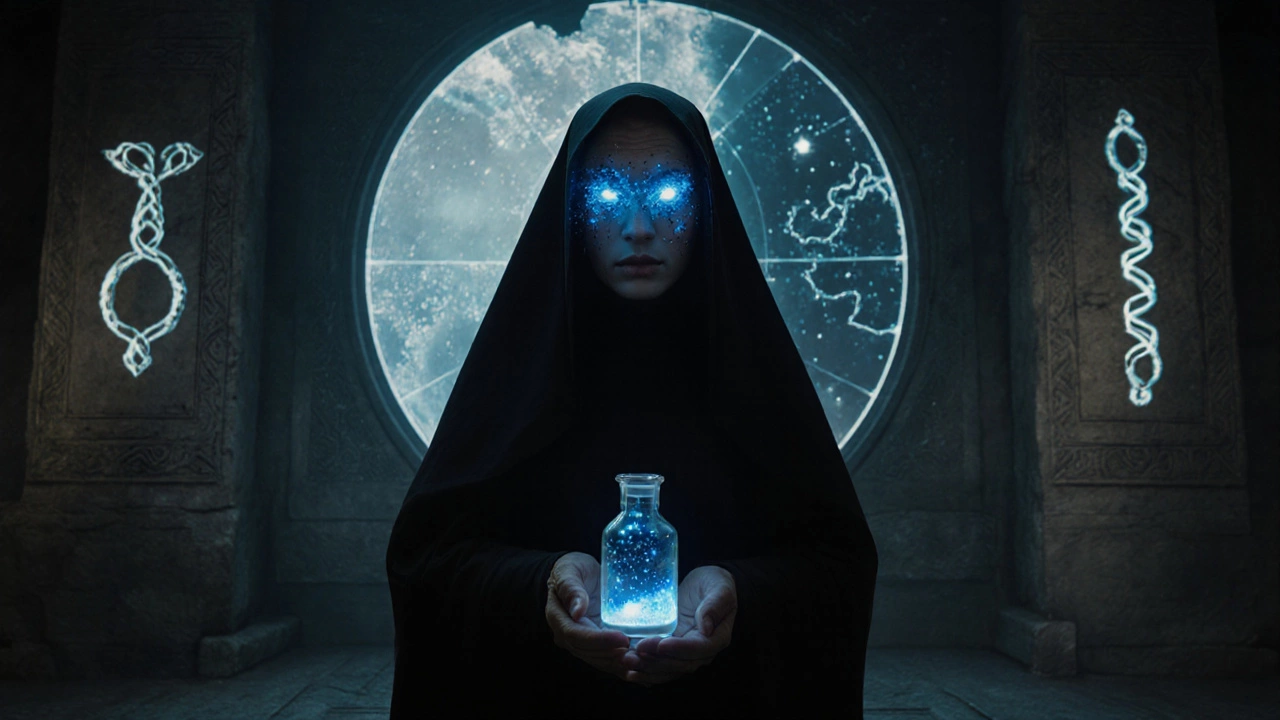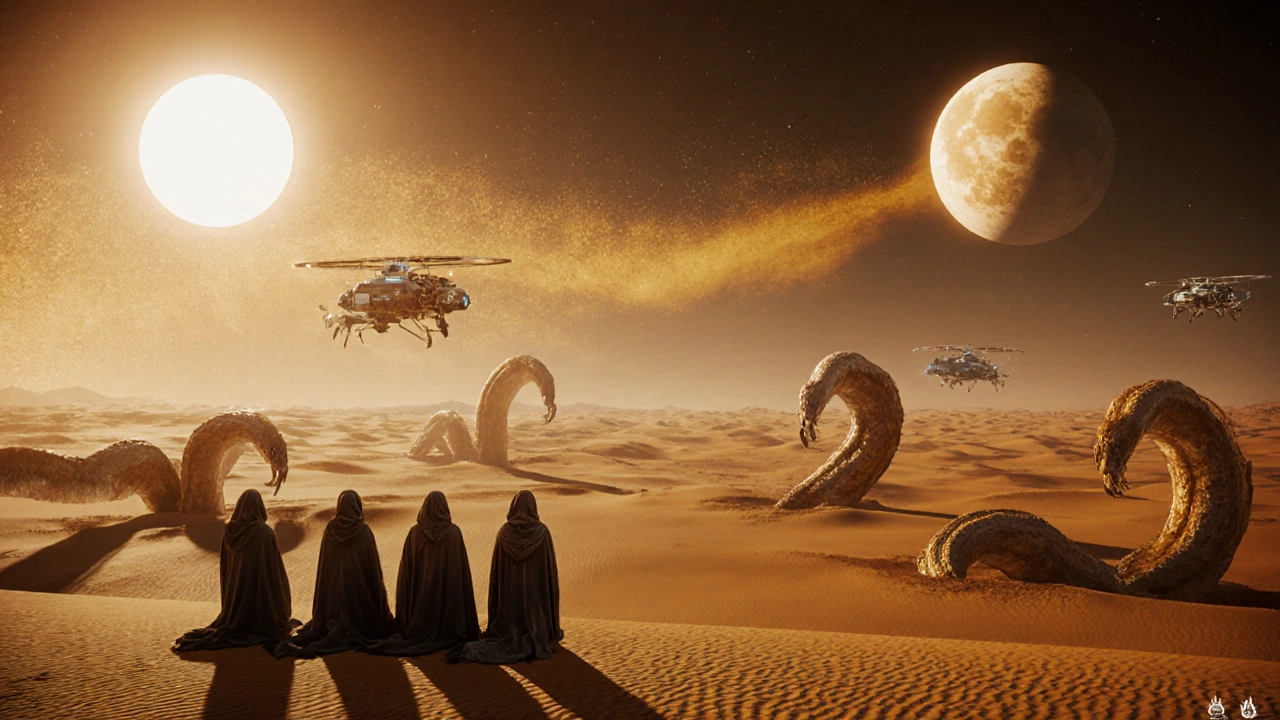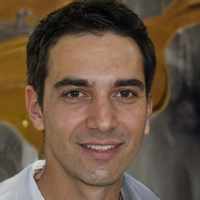Dune Genre Analysis Tool
Technology (Ornithopters, Shield Tech)
How much is explained by physics/biology/engineering?
Religious Systems (Bene Gesserit, Fremen)
How much is explained by faith/ritual/destiny?
Prophecy (Kwisatz Haderach)
How much is explained by faith vs scientific prediction?
Spice Melange
How much is explained by science vs religious significance?
Sandworms
How much is explained by biology vs spiritual significance?
Power Structures (Imperial Politics)
How much is explained by political systems vs mythological narratives?
Dune Genre Analysis
According to your selections: Dune contains 0% sci-fi elements and 0% fantasy elements.
This calculation shows how the story blends science fiction with fantasy. The article argues that Dune isn't just sci-fi or fantasy—it's both, with sci-fi providing the framework and fantasy providing the soul.
Frank Herbert’s Dune doesn’t fit neatly into one box. It’s not just space lasers and giant worms. It’s not just magic kingdoms and prophesied saviors. That’s why people keep asking: is Dune fantasy or sci-fi? The answer isn’t a simple yes or no. It’s both-and neither. And that’s exactly why it still feels revolutionary 60 years after it was published.
It’s Built on Science, But Feels Like Myth
Dune opens with a desert planet, spice that extends life and unlocks psychic powers, and a noble family caught in a cosmic power struggle. On paper, it’s science fiction: interstellar travel, advanced robotics, genetically engineered creatures, and a galactic empire ruled by feudal houses. The technology is explained with pseudo-scientific logic. The Spacing Guild’s foldspace navigation relies on spice-induced prescience. The Bene Gesserit’s breeding program is framed as biological engineering. Even the sandworms have a plausible ecological role in the planet’s water cycle.
But here’s the twist: none of that matters as much as the myth.
The story isn’t about how the technology works. It’s about how people believe in it. Paul Atreides becomes a messiah not because he’s the smartest or strongest, but because the Fremen have been waiting for one. Their religion, their prophecies, their rituals-they’re not science. They’re faith. And Frank Herbert knew that in the real world, belief drives history more than data ever could.
The Real Magic? Human Belief Systems
What makes Dune feel like fantasy isn’t dragons or wands. It’s the way belief shapes reality. The Bene Gesserit manipulate religion like a weapon. The Fremen turn Paul into a god through storytelling, ritual, and collective hope. The Spice Melange doesn’t just alter perception-it rewires culture. People worship it. They die for it. They build entire economies around it.
That’s classic fantasy territory. Think of Tolkien’s One Ring. It doesn’t have a technical manual. It has meaning. It corrupts. It inspires. It’s a symbol. The spice is the same. It’s not a drug with side effects-it’s a divine substance. The Fremen don’t analyze its molecular structure. They chant prayers over it. That’s not science fiction. That’s mythmaking.
Herbert didn’t just write a story about space. He wrote a story about how myths are made. He took the structure of ancient epics-the chosen one, the desert prophet, the fall of kings-and dropped them into a future where rockets replaced horses and sand replaced stone.
Why the Sci-Fi Label Stuck
When Dune came out in 1965, science fiction was dominated by hard-tech stories: rockets, robots, alien invasions. Publishers and critics needed a box to put it in. So they called it sci-fi. It had spaceships. It had planets. It had futuristic tech. Case closed.
But Herbert hated that label. He said he wrote a book about ecology, religion, and power-not about engineering. He didn’t want to write about how to build a spaceship. He wanted to write about what happens when people stop thinking for themselves and follow a leader they’ve been conditioned to worship.
Modern readers see this more clearly. The movie adaptations lean into the mythic tone. The costumes look like ancient robes, not futuristic uniforms. The dialogue echoes biblical prophecy. The music swells like a sacred chant. Even the sandworms are treated like divine beasts, not just giant animals.

Where Fantasy Ends and Sci-Fi Begins
Here’s a simple way to tell the difference in Dune:
- If it’s explained with physics, biology, or engineering-it’s sci-fi. (The ornithopters, the shield technology, the water reclamation systems.)
- If it’s explained with faith, ritual, or destiny-it’s fantasy. (The Kwisatz Haderach prophecy, the Litany Against Fear, the idea that Paul is the Messiah.)
The genius of Dune is that these two systems don’t just coexist. They feed each other. The sci-fi tech enables the fantasy. The fantasy justifies the tech. The Bene Gesserit use genetic science to create a messiah-but only because people are ready to believe in one.
That’s why Dune doesn’t belong in the same category as Star Wars. Star Wars is fantasy with spaceships. Dune is science fiction dressed in myth-and then buried under layers of religious symbolism, political manipulation, and ecological warning.
It’s More Than Genre. It’s a Warning.
Herbert wasn’t trying to build a new world. He was trying to warn us about the ones we already live in.
Think about how often we follow leaders because they sound like prophets. How often we trust systems because they’re backed by tradition, not evidence. How often we worship technology because we don’t understand it.
Dune shows what happens when a society confuses prophecy with progress. When a people give up their power to a chosen one, even if he’s just a man with a spice-fueled vision. That’s not fantasy. That’s history. And that’s why the book still terrifies us today.

Why This Matters for Readers
If you read Dune as pure sci-fi, you miss half the story. You focus on the tech and miss the psychology. You think about how the sandworms move, not why people worship them.
If you read it as pure fantasy, you ignore the warning. You see magic and forget that the real magic here is human gullibility.
The best way to read Dune is to accept that it’s a hybrid. It’s science fiction that uses the tools of myth to expose the dangers of blind faith. It’s fantasy that’s grounded in real-world systems of power, control, and belief.
That’s why it’s not just a book. It’s a mirror.
What Dune Tells Us About Other Stories
Once you see Dune this way, you start noticing it everywhere.
Game of Thrones? Same pattern. Feudal politics, ancient prophecies, a boy who’s told he’s destined to rule. But the dragons? They’re real. The magic? It’s there. Yet the story’s power comes from how people use those elements to control others.
The Matrix? A sci-fi world with a messiah narrative. Neo doesn’t win because he’s better with a gun. He wins because he stops believing the system is real.
Dune started this trend. It showed that the future doesn’t need wizards. It just needs people who believe.
Final Answer: It’s Both
Is Dune fantasy or sci-fi? Yes.
It’s science fiction because it’s built on plausible systems-ecology, politics, technology. But it’s fantasy because its heart beats with myth, prophecy, and the power of belief.
Don’t pick one. Embrace both. That’s the point.
Is Dune considered science fiction or fantasy by critics?
Most critics and scholars classify Dune as science fiction because of its futuristic setting, advanced technology, and scientific themes like ecology and genetics. But they also acknowledge its deep mythological structure, religious symbolism, and messianic narrative-which are hallmarks of fantasy. The consensus is that it blends both genres, with sci-fi as the framework and fantasy as the soul.
Why do some people call Dune a space opera?
Dune is often called a space opera because it features grand, dramatic storytelling across interstellar empires, noble houses, epic battles, and larger-than-life characters. Unlike hard sci-fi that focuses on technical accuracy, space operas prioritize emotion, politics, and destiny. Dune fits this perfectly-it’s less about how the spaceship works and more about who gets to rule the galaxy.
Does the spice make Dune fantasy?
The spice Melange is the key to the genre debate. On one hand, it’s presented as a biological substance with real physical effects-extending life, enhancing cognition, enabling space travel. That’s sci-fi. On the other hand, it’s worshipped as sacred, tied to prophecy, and believed to be a divine gift. That’s fantasy. The spice isn’t magic, but the way people react to it turns it into something mystical.
Are the sandworms fantasy creatures?
Biologically, the sandworms are explained as native desert organisms with a complex life cycle tied to the planet’s water and spice production. That’s sci-fi worldbuilding. But culturally, they’re treated as gods by the Fremen. They’re feared, revered, and seen as sacred beings. That’s fantasy. Their role in the story isn’t just ecological-it’s spiritual.
How does Dune compare to other fantasy stories like Lord of the Rings?
Both stories feature chosen heroes, ancient prophecies, and mythic journeys. But Tolkien’s world runs on magic-explicit, unexplained forces. Dune’s world runs on science that’s been twisted into religion. The One Ring is magical. The Spice is biological-but people treat it like magic. That’s the difference: Dune makes fantasy out of science, while Tolkien makes science out of fantasy.
Is Dune more about religion than technology?
Yes. While Dune has advanced tech, the real focus is on how religion shapes power. The Bene Gesserit, the Fremen, the Spacing Guild-all use belief systems to control people. The technology is just the tool. The real engine of the story is how humans create and surrender to myths. Herbert was more interested in the psychology of faith than in the mechanics of spaceships.

